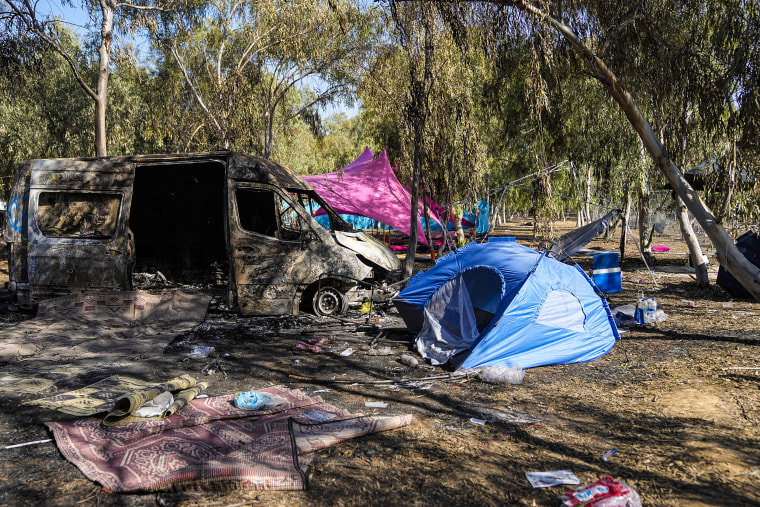Anyone who watched the first, horrifying videos of Hamas’ attacks on Israeli civilians on Oct. 7 could reasonably assume that sexual violence was at least part of this terror campaign. Bystanders recounted the rapes of friends at the Supernova music festival. Further reporting has supplied more details of the extraordinarily brutal picture of sexual assaults that took place. And while sexual trauma is often hard to document because of shame, bias and a lack of witnesses, Cochav Elkayam-Levy, the director of the Israeli Commission on Hamas’ October 7 Crimes Against Women, argues for more resources to document this evidence but unsparingly relays that the problem here is simpler: Many of these victims cannot speak up because they are dead (some of them, forensic evidence suggests, were posthumously violated again).
In times of war and peace, rape is always a crime. Sexual violence on the battlefield, perpetrated against women, children and men, remains perhaps the ultimate, most intrusive way of asserting dominance, and international law in the last three decades has criminalized this behavior more strongly. Here in the U.S., breaches of sexual consent in civilian life (intimate partner violence, street harassment, workplace propositions, etc.) have increasingly come to be understood as existing on a continuum with stranger rape, all of which merit redress. Feminist activists can largely take credit for this formidable progress on all fronts.
So why, then, in a moment when statements of solidarity fly fast and furious, have feminists and their progressive allies not been more outspoken about the grotesque sexual violence visited upon Israeli women on Oct. 7?

Many feminist organizations rushed to express support for the Palestinian cause while eliding the plight of Israeli victims. The organization UN Women issued a four-page report last month exclusively addressing the impact of the war on women and girls in Gaza but made only a brief condemnation of the Oct. 7 attack that made no mention of the sexual violence that had been reported. A group of prominent scholars circulated a letter under the title “Feminists for a Free Palestine,” without explicitly condemning the sexual violence against Israeli women.
College campus groups have furnished other examples, such as the women’s students’ groups at Harvard that signed on to a letter holding Israel entirely responsible for the Oct. 7 attacks or the (now-former) director of the University of Alberta’s Sexual Assault Center’s signing on to a letter doubting the veracity of accounts of Israeli rape survivors. Even the office on my own campus that is devoted to helping students “lead social-justice centered lives” issued thousands of words in solidarity with the Palestinians and did not once acknowledge the sexual violence (or murder or abduction) perpetrated by Hamas. And then there are the familiar conversations like those that Miriam Schler, the executive director of a Tel Aviv crisis center, reports having with friends who style themselves “champions of human rights, feminism, and social justice” but who “have been bending over backwards to justify atrocities and rationalize rape.”

This tragic minimization — or justification, in some cases — of violence against Israeli women appears to be the result of an ideological turn among some feminists and progressives that elevates an “antiracist” agenda above the core feminist commitment to defend the universal right to bodily autonomy for all women. This argument contends that because Israel is a colonial power oppressing the Palestinians, any resistance is a justified dimension of decolonization. The “settler colonialism” concept that undergirds this position, however, is insufficient to characterize a complex conflict between two majority nonwhite peoples who both have long-standing claims to the contested land. When such a theory serves to excuse rape, it is simply indefensible.
This impulse, importantly, comes from an inspired place: the effort by Western feminists to depart from the movement’s long history of racial exclusivity. At the movement’s inception in the 19th century, white women fought for their own suffrage at the expense of Black enfranchisement and for decades often uncritically sought personal advancement within political and labor systems that excluded women of color.
Rape was an arena in which this racial disparity was most acutely felt — and where multiracial feminist coalitions have formed most powerfully, especially since the 1970s. Nonwhite and working-class women had long been largely disbelieved when they accused men of rape — Black women were considered “inviolable,” because they were either categorized as property during slavery or, after emancipation, deemed lacking in virtue. The anti-rape movement combated these glaring biases in the legal system and the culture. Rejecting the idea that some women were inherently more credible or “legitimate” victims of sexual violence than others based on their race or class background became one of the movement’s organizing objectives and animated some of its most important contributions.
Has the feminist movement become so hidebound by a reductive conception of liberation that it has abandoned its essential purpose to defend the bodily autonomy of all women, regardless of their identities or political contexts? For all the talk of antiracism, the skepticism that has met Israeli women’s claims is perpetuating a centuries-long antisemitic tradition of dehumanizing Jews.
Has the feminist movement become so hidebound by a reductive conception of liberation that it has abandoned its essential purpose to defend the bodily autonomy of all women?
In stark contrast, former Facebook Chief Operating Officer and feminist writer Sheryl Sandberg issued a plea this week that is both obvious and urgent: Regardless of our politics, we must all unconditionally denounce rape. It is telling that it took six weeks for an unsparing condemnation of this act of mass sexual violence from a prominent feminist to surface and that it came from Sandberg, whose “lean-in feminism” is commonly (and I think sometimes fairly) criticized by progressives as individualistic and corporatist. Unfettered by the ideological commitments of the left at this moment, however, she articulated a truth too few have dared to express. Sandberg joins a small and hopefully growing number of less well-known voices raising similar alarms.
The most vocal American advocates for taking the rapes of Israeli women seriously, however, have been from the political right. Even a glancing assessment of their record on reproductive rights, rape legislation or essentially any “women’s issue” suggests this advocacy is as much about instrumentalizing this gender-based violence to advance Israeli military interests as it is about sincere concern.
Along with fighting to free Palestinians from Hamas, feminists should be the loudest in decrying this mass sexual violence perpetrated during the largest murder of Jews since the Holocaust. Fortunately, feminism has always been a work in progress, and this is not the first time the movement must break free of obsolete, obstructionist ideology to more equitably advance the interests of all women. As a historian of gender, a feminist, a woman and a Jew, I hope we move forward by returning to the movement’s most important principle: the essential worth and bodily integrity of all women.
